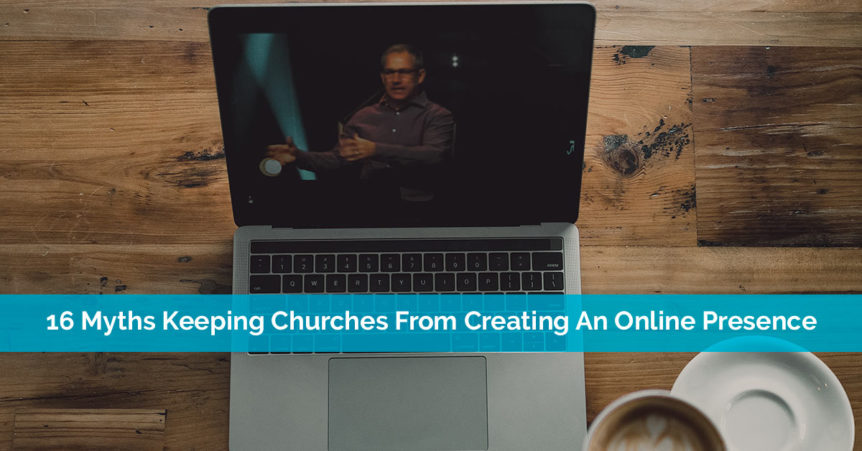Creating an online presence isn’t nearly as difficult as it was 15 or 20 years ago. In fact, it’s easier than ever, yet many churches still don’t even have a basic website or social media presence.
Why? Typically, it’s due to myths that make it seem impossible for any church that doesn’t have thousands of members to make it work.
If you want to reach more people, stay in contact with your members and grow your church, it’s time to let these 16 myths go and dive into creating at least a small online presence for your church.
1. It Costs Too Much
It’s true that a church website will cost money. However, you don’t need every bell and whistle that exists. If you’re just starting out, all you need is a simple, yet professional looking site to showcase details about your service and event hours, history and mission of your church, ministry groups and a blog.
While costs will vary based on what you want and who you work with, it’s more affordable than you might think. Odds are, you could host an event to help raise money for a church website.
If you’ve ever been tempted by using a free website builder and host, please don’t! There are so many reasons why this is a bad idea, despite the obvious benefit of not having to pay anything. However, you will pay and pay dearly.
In fact, you’ll have to deal with things, such as:
- Slow loading pages, which hurt your search rank and reach
- Numerous fees for anything beyond the bare basics
- Little to no customization options
- Your host may actually have rights to your content
- Few options to add other features
- Little security
- Low bandwidth, meaning no streaming and limited visitors
- Little storage, meaning not being able to add videos to your site
As you can see, “free” doesn’t really mean free. You’ll have to sacrifice quite a bit. It’s much better to pay a one-time fee to have a professional, custom-made church website. It’ll perform much better and help grow your church.
2. You Need Experience
Creating an online presence doesn’t mean you have to be an experienced web designer, content writer, videographer or social media expert. All you need is a willingness to learn.
Once your church website is set up, most of the management is straight-forward. After a few weeks, you’ll be uploading content and customizing pages like a pro. Remember, if you need help, all you have to do is ask. Besides, there’s a YouTube video for everything out there and your web designer can answer questions to help you learn the ropes.
If you’re having trouble with developing content, ask your members to help, especially teens and young adults. They’re experts at shooting videos for social media and know what types of content get shared most. You may even be lucky enough to have a writer as part of your church family.
When it comes to social media, take your time and pay attention to what other churches are doing. Of course, you can also just go through older posts on our blog to learn what to do and what not to do when it comes to website content and social media posts.
If you don’t mind spending a little extra time the first few weeks, you’ll learn everything you need to get started.
3. Social Media’s Just For Brands
We don’t know where this myth came from, but it shouldn’t stop you from creating an online presence. Social media is for everyone. Besides, your church is a brand. You don’t have to be a for-profit business to be considered a brand.

If you want to interact with people online and have a message to share, then you should be using social media. If you still don’t think there’s any reason for a church to be on social media, check out Unseminary’s list of 10 churches that have the whole social media thing down to a fine art. The Creative Pastor lists 30 more to give you even more inspiration.
4. No One’s Interested
Does your church have any members? If the answer is yes, than there is someone who is interested. Even if you only have members 50 and up, they’d love to be able to stay in contact via your church website and social media.
All age groups use the Internet, even if every single person doesn’t. Over four billion people use the Internet worldwide or 56.8% of the world’s population. Keep in mind, many areas globally and even in America still don’t have any form of Internet access and of those that do, some still only have dial-up.
In North America, 89.4% of the population uses the Internet regularly. With so many people online, someone’s going to be interested.
Don’t expect to have your church go viral, though it could happen. Just expect people to gradually find your website. Even if they don’t come to your church, many people love finding faith-based communities to interact with. Give them that community by creating an online presence.
5. There’s Too Much Competition
Yes, there is competition out there. That’s a fact that can’t be denied. However, why should that stop your church from creating an online presence?
New businesses start everyday and the best rise to the top. Just because there may be thousands of other churches online, it doesn’t mean your voice shouldn’t be heard too.
Someone is waiting for what you have to say. They’ve interacted with other church websites and social media pages, but just haven’t found the right fit. You could be that fit. But, if you never get online, they’ll never find you. It’s not about competition. It’s about putting more positivity and inspiration into a world that’s far too negative.
6. It’s Too Negative
On that thought, it’s a common myth that the Internet is too negative of a place for churches. However, that’s exactly why your church needs to be online.
The Internet has given rise to anonymous trolls. Anonymity really can bring out the worst in humanity. Yet, bad things happen every day that have nothing to do with the Internet. Just watch the local news for a week and you’ll see it’s true.
Even when so many bad things are posted online, there are bright spots. Your church’s online presence doesn’t have to be negative. Block those who seek to taint your church’s social media pages or blog posts. You can keep it positive with just a little work and create a better place for people to come together online.
7. Blogging Is Complicated
Okay, this one is kind of true, but it doesn’t have to be. You’re not trying to publish the next bestselling novel. You’re writing a blog post. Let’s simplify this. All you really need to do to start blogging is:

- Grammar is important, but you don’t have to talk like an English professor.
- Longer posts are preferable, but that can be anything from 500 to over 2,000 words, so do what works for you.
- Make posts useful and try to avoid rambling. Think of them like concentrated sermons.
- Use one or two keywords or phrases, but use them naturally. If they don’t fit naturally, don’t use them.
See, it’s not really that difficult. If you need a little help getting started, try these resources:
- The Anatomy Of A Perfect Blog Post
- 20 Things To Remember For Writing The Perfect Blog Post
- How To Write An Awesome Blog Post In 5 Steps
- The 8 Essential Elements Of A Successful Blog Post
- Creating A Church Blog Strategy That Works
One last piece of advice, let someone else read over your posts to make sure they’re useful and as close to grammatically correct as possible.
8. There’s Nothing To Talk About
When you meet a perfect stranger, you might not have anything to say. When you’re with your spouse or best friend, you can’t seem to shut up. The latter is true when it comes to creating an online presence. There’s always something to talk about.
For help coming up with topics, pay close attention to our blog post about creating a blogging strategy.
9. You Can’t Avoid Controversy
Sadly, you can’t always please everyone and sometimes, you may even offend people. However, you don’t have to give in to controversy. For instance, some people on Facebook may get offended if a Christian friend shares a Christian meme.
That Christian friend could give in to the controversy and argue about things. Or, they could realize they have the right to post what they believe in. If others don’t like it, they don’t have to interact with the post.
If people want to bring controversy to your social media pages or website, remind them that this is a positive place. They can ask questions, but if they can’t play nice, they will be banned. You should also consult this guide to what to avoid posting on social media.
10. Everyone’s Already In Church
Do you know how many people move to your general area every week or month? If they’re searching for a new church, they’re probably going to search online first. If you’re not listed, you’re not one of their first choices.

Besides, everyone who believes in God isn’t already in church. They may not be physically able to go or they can’t find a church with the same values. Creating an online presence allows you to reach millions who aren’t in church, but want to explore their faith with like-minded people.
11. You Have To Be On Every Platform
This couldn’t be further from the truth. In fact, all you really need is one. Just pick one that most of your members use so you can stay in contact more easily.
In most cases, Facebook works well for most churches, though you can add more if you want, but only if you want.
12. It Takes A Large Team
Ideally, you do want more than one person managing your church’s online presence. However, a small team of 2-4 can easily manage a small church’s website content and social media posts.
Volunteers make this more cost effective, but just make sure they’re trained on what to do and what not to do.
13. You Have To Live On Social Media
Social media is a 24/7 place. However, you don’t have to be active 24/7. Just pick a posting schedule and stick to it. Have someone available to respond to posts during the day and someone during the evening. Usually, these are volunteers who use the social media platform(s) daily anyway.
You could even just be available for a few hours a day, such as while you’re writing your sermon or managing daily administrative tasks.
14. It Takes Too Much Time
In that same vein, creating an online presence will take more time at first. Expect to spend more time during the first month as you learn the ropes and start developing content.

Once you get the initial steps out of the way, it doesn’t take long at all. If you have a 2-4 person team, each person may only spend a few hours each week. That’s not a large investment considering how big of an impact it could have on people locally and worldwide.
15. No One Tithes Online
Actually, many people prefer online tithing. It’s more convenient. However, if your church doesn’t have an online presence, you don’t have a way to offer this.
Plus, you can receive donations from people who enjoy your online content, but don’t actually come to your church. This can help support your church so you can continue guiding people in their faith and inspiring them when they’re at their lowest.
16. It’ll Make People Avoid Your Church
It’s true that some people balk at churches that do anything more modern, such as embracing technology and the Internet. However, as long as you’re still offering traditional services in church and don’t require members to be online, you’ll be fine.
As long as you’re keeping the same tone and positive attitude online as you do in your church, you may actually bring more people to your church. That’s a win for everyone.
Ready to start creating an online presence for your church? Start with a professional designed church website. Contact us today to learn more.




